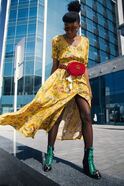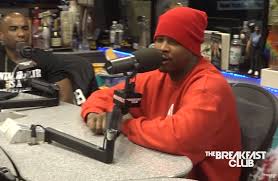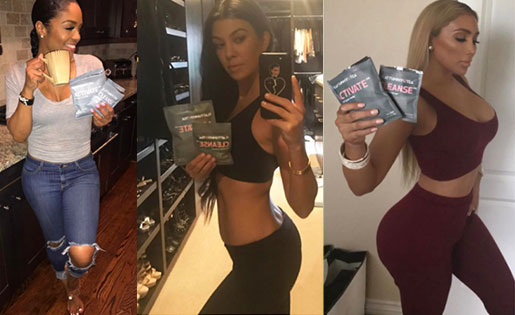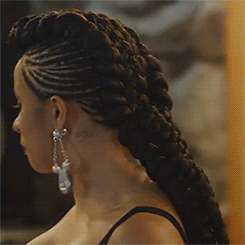|
It's no secret that we live in a society that where trends are temporary. In truth, things are more cyclical than temporary. We seem to be interested in things in waves. Fashion tends to cycle every 20 or 30 years. Who would've thought fanny packs and multi-colored attire would've been back in style? Maybe those who were around to see the evolution of hi-top fade. If you look closely enough you'd find the same trend in music and other socio-cultural phenomena. Today's Fanny Pack Recently, we've seen a surgence in the conversation about wellness and people of color. The discussions about the need for therapy are heard daily on The Breakfast Club and pushed forward by Charlamagne Tha God, who openly talks about his weekly sessions with his therapist and wrote a book on the topic of his anxiety. Taraji P. Henson started an organization to increase the awareness of mental health in our community and to encourage more people of underserved communities to enter the mental health field. All of a sudden our people seem more open to not only talk about their struggles but also using therapy and other wellness techniques/services for improving emotional health. YG talks to The Breakfast Club Meditation, yoga, life coaching, spiritual healing, working out, plant based diets and essential oils are also often seen in popular media right alongside therapy. As a therapist, I'm pleased and scared at the Same. Damn. Time. I've been doing this work for 20 years. 20 years of seeing some of the worst atrocities that the human spirit could have to endure. 20 years of trying to convince young people, predominantly Black young people, that getting support to unlearn what could kill them (emotionally and physically) didn't make them ‘crazy.’ I remember Oprah not being well lauded because her topics of wellness, meditation and spiritual alignment didn't feel 'Black enough.' I remember growing up where the definition of Blackness was synonymous with struggle and pain. And we wore that like a badge of honor. Then, we didn't even seem to conceptualize healing.; now, healing is a big business and we've joined the market like the good consumers we are. Unlike other trends, this is new for our community. Historically, our distrust of systems has not allowed us to consider therapy or other healing modalities as viable resources. The church alter or the botanica were the only places many of us knew to go to receive our healing or seek answers. The addition of other modalities to our tool box is exciting. But we need to be mindful that not everyone is here to meet our needs. Celebrities for Flat Tummy Tea Do you remember Flat Tummy Tea? A few years ago you could not go to the IG page of any celebrity without seeing it. Everyone swore they used it to lose weight and keep them trim. This was before we realized that celebrities were getting paid for advertisements on social media. Most people just thought they were being let in on a secret and a lot of people bought the product just for that reason. It didn’t take too long for people to realize that you felt and looked lighter because it made you go to the bathroom. Sure you looked smaller, but the effects weren’t healthy or long lasting. Diarrhea gives the illusion of weight loss, but with the same habits you will gain the weight back quickly and not feel too good about it.
A recent article talks about the business of healing through mindfulness and the potential backlash against it. Right now wellness is a 4.2 trillion dollar industry. While a quick search doesn’t yield the specific numbers of how much Black people spend in the wellness category, we know that we typically make up about 15 to 20 percent of each retail category. If we go with these numbers we are talking about the Black dollar being worth at least 500 million dollars. This explains some of the increase in “helpers.” Is it just me, or does there seem to be guru's popping up everywhere. Everyone wants to be a coach, everyone has an answer for your healing. Literally, it feels like Flat Tummy Tea for the soul: healing modalities on everyone's page and a new coach and opportunity to heal popping up everywhere. Now, don't get me wrong I'm not hating. I think the more people that give Black people what we need is critical. However, I want us to think about where we are getting it from. When you understand the social factors that contribute to our greater presentation of illnesses (mental and physical) you understand the urgency for us. We are 20 percent more likely to experience serious mental health problems and can not afford to receive support from those who are only in it for money or who lack true training, understanding or skill set to support us. I am definitely not saying that the only way someone can be qualified is to receive formal education. But I am saying you should take note of who they are, what's their message and understand how they plan to help you. Here are 5 questions you should ask anyone before you start paying for their services:
Of course these questions don't cover all the information you need, but it should help you start a conversation and get a good vibe for who they are. Ultimately, embarking on a healing journey requires courage. You may know that something isn't right and not sure what you want to change. You may know exactly what you want to work on or work towards. Understanding your needs is the main key to the journey. Choosing the right person(s) is a critical piece to that work. Don't be afraid to ask for what you need, question what doesn't make sense or leave where you don't receive what you are looking for. The work of healing and being well should not be temporary. It is not a quick fix. This is life long work and my hope is that it stays in the discourse of our community FOREVA!
1 Comment
Leave a Reply. |
Archives
June 2024
|





 RSS Feed
RSS Feed